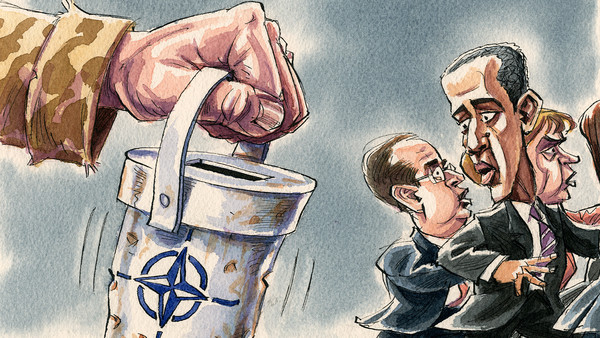
From Philip Stephens, Financial Times: The absence of war does not deprive the alliance of a raison d’être. If the west has learnt anything about the post-cold war era, it should be that life is unpredictable. The Middle East is in flames, Iran is building a bomb and jihadist extremism has been spreading into Africa. Cyber space has added the threat of mass disruption to that of mass destruction. The rising states, not all of them natural allies, are spending more on their militaries. . . .
A Nato properly “prepared” to confront new threats requires military capabilities. They have to be paid for. No one wants to pick up the bill.
Austerity has bred complacency. Most of the European members of Nato long ago abandoned a supposed commitment to spend 2 per cent of national income on defence. Now they are looking for a post-Afghanistan “dividend”. Britain and France, in relative terms the big spenders on the European side, are hollowing out their militaries.
These two nations’ palpable enthusiasm for foreign intervention, whether in Libya, Mali or Syria, sits in inverse proportion to their willingness to spend money. Military budgets elsewhere in Europe are heading below 1 per cent. Even the former communist states that voice alarm about Russia’s intentions have taken an axe to their own forces.
As long as the US was prepared to pick up the bill, this could be glossed over. Washington’s share of Nato spending has jumped from 50 to almost 75 per cent. But sequestration has brought down the curtain on the era of American military plenty. Even if the White House and Congress strike a fiscal deal, the US defence budget faces deep cuts. Politicians in Washington are not willing to pay the price of European parsimony.
The case for Nato should make itself. Anyone who thinks the advanced nations can afford to spend less on safeguarding their security need only glance at events in the Middle East and the Maghreb, at nuclear proliferation, clashes in cyber space or at the violent extremists populating failing states.
What all these threats have in common is that they require collective defence. But even as they reduce their own spending, Nato governments prefer the illusion of inviolable national sovereignty to the pooling of capabilities and sharing of secrets. The present approach ultimately condemns Nato to slow death by a thousand spending cuts. The more honest thing to do would be simply to shut it down.
Image: ft%203%208%2013%20NATP%20pay%20up.jpg
